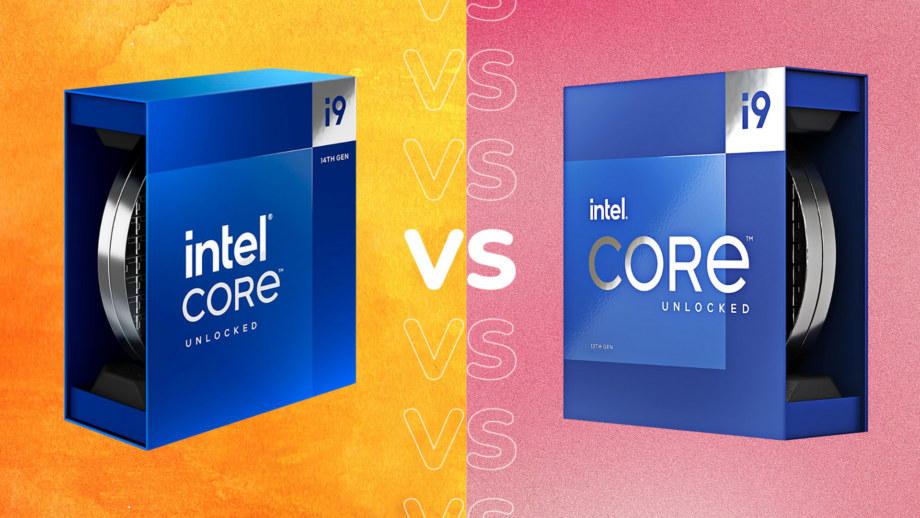Intel Core i9-14900K vs Intel Core i9-13900K: What’s the difference?

The Intel Core i9-14900K is the latest consumer desktop processor to launch under the team blue’s umbrella, but how does it differ from its predecessor, the Intel Core i9-13900K?
There are actually fewer differences than you might expect, with the two Intel chips sharing the same Raptor Lake architecture, despite the differing generations.
But Intel has still made a few tweaks to ensure a performance boost for its newer processor. We’ve reviewed both processors, so check out our comparison guide below to find out how big of a performance jump you’ll get with the Intel Core i9-14900K.
Price and availability
The Intel Core i9-14900K launched back in October 2023 with a RRP of $589. That’s the exact same price as the older Intel Core i9-13900K when it launched back in September 2022.
Rather surprisingly, the Intel Core i9-13900K hasn’t seen a universal price drop to account for its newer sibling, although you can see significant price cuts at select retailers such as eBuyer. You’ll need to shop around for the best discount.
Specs
When making a generational jump, you’ll generally expect to see Intel move onto a new processor architecture, but that’s not the case here. Both the Intel Core i9-14900K and Intel Core i9-13900K are based on Intel 7 Process technology, which makes use of a 10nm process node.
As a result, Intel is calling the 14th Generation a Raptor Lake refresh, rather than the eagerly anticipated move to Meteor Lake. Intel isn’t increasing the core and thread count compared to Intel Core i9-13900K either, sticking to the 24-core and 32-thread count.
The biggest news of the Intel Core i9-14900K is the fact that it’s capable of hitting a 6Ghz max turbo frequency, becoming one of the very first processors to be capable of such a feat. In comparison, the Intel Core i9-13900K is capable of a 5.8GHz max turbo frequency.
Intel Core i9-14900K is confirmed to support Wi-Fi 7, the latest wireless network technology. Wi-Fi 7 delivers a peak rate of 40Gbps, making it 4x faster than Wi-Fi 6E on the 13900K. It’s a slight shame that the Intel Core i9-14900K won’t offer integrated support for Wi-Fi 7, so you’ll need to purchase a separate antenna in order to get the latest wireless standard running on your PC.
Performance
We have tested and reviewed both of the Intel Core i9-14900K and Intel Core i9-13900K desktop processors, and so have a good understanding of the performance difference. Unsurprisingly, our results showed that there isn’t much of a difference at all.
The Intel Core i9-14900K does steal a marginal lead across all of our synthetic benchmark tests, proving that it’s the faster processor when it comes to both single-core and multi-core performance. It’s undoubtedly the faster chip of the two.
But our gaming benchmarks show just how little there is between the two processors in terms of performance. When testing the processors with games at a 1080p resolution, the Intel Core i9-14900K boasted a 3fps advantage for Returnal and 2fps jump for Dirt Rally. In fact, the older Intel Core i9-13900K even stole marginal leads for the likes of Horizon Zero Dawn, Borderlands 3 and CyberPunk 2077.
This emphasises just how little the difference is for these desktop processors in terms of performance. The Intel Core i9-14900K may be more powerful, but not by enough of a margin to make it hugely noticeable.
Power consumption and temperature
The Intel Core i9-14900K may be the faster chip out of the two, but Intel has been forced to make some compromises to achieve such speeds, namely a higher power draw and peak temperature.
When testing the two processors using the same test rig, the Intel Core i9-14900K saw a peak power draw of 622.1W when under stress, while the Intel Core i9-13900K recorded a peak draw of 551.6W – that’s a huge 70.5W difference.
Our tests also showed that the Intel Core i9-14900K ran hotter than its predecessor, hitting 98°C during a benchmark. The Intel Core i9-13900K can hardly be considered a cool chip, but it was still 8 degrees cooler than its 14th Gen sibling.
With such a little performance gap between the two processors, this means the Intel Core i9-13900K is the most efficient option if you’re concerned about power consumption or thermal performance.
Verdict
There isn’t really a clear answer for this one. The Intel Core i9-14900K is the most powerful desktop processor, consistently scoring higher than the Intel Core i9-13900K in our benchmarks. Yet the performance upgrade wasn’t significant enough for this to translate to noticeable performance uplift, especially when it comes to gaming.
And while the Intel Core i9-13900K may be marginally slower, it also consumes far less power and is easier to keep cool. If this chip was noticeably cheaper than its new sibling, then it would be the better choice – but more often than not, they occupy the same price point.
As a wild card, it may be worth waiting for the Intel Core i9-15900K. It will potentially arrive in late 2024, and should see a greater generational performance uplift thanks to the move to a new architecture.








